- Home
- Amanda Hocking
The Ever After Page 14
The Ever After Read online
Page 14
“That sounds rough,” I said.
“It’s all I’ve known,” he said, giving his wife a loving look. “And Rina helps me remember.”
“Johan told me everything that you talked about, but I didn’t really understand what your intent is,” Sarina went on cagily. “What are you trying to find?”
“Her parents and our friend Eliana,” Hanna answered before I could.
“And how does that connect to a children’s story that your grandfather wrote decades ago?” Sarina asked.
“Johan wrote about Jem-Kruk and Senka,” I told her. “I met someone called Jem-Kruk who knows our friend Eliana and her twin sister, Illaria. I went to Sweden to meet with Indu Mattison—”
Sarina’s eyelids fluttered; the corner of her mouth twitched ever so slightly at the mention of Indu’s name.
“—and he told me that Eliana, Illaria, and I all share the same mother,” I explained. “Someone called Senka.”
Sarina pursed her lips but didn’t say anything.
“Indu held me captive for a month,” I said, choosing my words very carefully because I was acutely aware of Hanna and Niko listening. “I can’t remember what happened, and I can’t find Eliana. I want to know what’s going on, and I think that you and Johan know something that might help me.”
Sarina lowered her eyes then and put her hand on Johan’s. He watched her with a look of sympathy and absolute adoration.
“I know when you left, we promised to never speak of it again,” he told her softly. “But that was a long, long time ago.”
Her jaw tensed. “It’s about keeping everyone safe.”
“My love,” he said gently. “Ulla wasn’t safe. We can help her, and we might be able to help her sisters.”
She closed her eyes and took a deep breath. “I knew Indu and I knew Senka. In another life.” When she opened her eyes again, she couldn’t mask the pain, and she gripped tightly onto her husband’s hand. “Before I left with Johan, I lived in Áibmoráigi. I was a thrimavolk, one of the daughters of the Älvolk.”
29
Parable
“The name given to me by my father was Rinatte Freya Somdottir,” Sarina said with a strange resignation on her face, like she always knew one day she’d have to say her given name again but it still left a bitter taste in her mouth.
I didn’t like that it pained her to tell me, but I had to know the truth. Especially since others might still be in trouble, like Eliana and Bekk and her daughter, Juno.
“I never knew my mother, but she was from Isarna and I suspected she was Trylle,” Sarina went on. “My father was Som Kerrson, an Älvolk like his father and his father before him, and he was one of the young men that had been energized by the new leadership that focused on the teachings of Frey.
“As a mere thrimavolk, I wasn’t privy to all of the machinations of the Älvolk,” she said with a sneer. “But I knew enough. Throughout their history, the Älvolk were mostly peaceful, preferring to keep to themselves and protect their secrets and treasures.
“Áibmoráigi and the Bridge of Dimma are sacred to them, even in their ruination, and they want to protect what they have left,” Sarina said. “That was all they truly cared about, until the young men embraced the wicked tenets of the Freyarian leaders, partaking in blodseider magick and helifiske. The latter was how the thrimavolk numbers quadrupled in a single generation.”
“What are thrimavolk?” Hanna asked.
Niko had apparently grown bored and fallen asleep, his head lolling against the crook of her arm.
“The thrimavolk are the daughters of the Älvolk,” Sarina answered. “They are warriors, the guardians of Áibmoráigi and the Älvolk. Our fathers are the protectors of the history and creators of order, and the daughters enforce their rule.”
“So … they’re the brain, and you’re the brawn?” Hanna asked skeptically, but that was reasonable given Sarina’s rather frail appearance.
“Something like that. But not all thrimavolk turned out the way the Älvolk intended.” Sarina smiled briefly, but it quickly fell away. “Indu and I were born a year apart, the first children of the Freyarian Älvolk. My father, Som, and Indu’s father, Mattis, were both devout followers and eventually chieftains among the Älvolk.
“Mattis died when Indu and I were still children,” Sarina continued. “Indu couldn’t have been more than eight or nine, and they tapped him for an important leadership role. I didn’t see much of him after that, not until I was much older.”
She stared off for a moment, thinking. “The life of a thrimavolk is order, discipline, sacrifice. My time was filled with ritualistic training and intensive chores. Exercise and combat in the mornings, cleaning and sewing in the afternoons, choir and quiet contemplation in the evenings.
“But I didn’t know any better,” she said. “When I was a teenager, I was allowed to venture outside Áibmoráigi for the first time, to forage and hunt in the mountains. If it went well, I might have eventually earned the privilege to trade with the humans and go to their villages. But it did not go well.”
“She met me,” Johan said with a squeeze of her hand, and she returned his adoring smile.
“That I did,” she said wistfully. “I met Senka first, and we became friends, and she told me of a life that didn’t involve complete servitude. And then I met Johan and we fell in love, and I knew I had to get out of Áibmoráigi.”
“Where did Senka and Johan come from?” I asked. “Isarna? A human town?”
She took a deep breath. “They came across the Bridge of Dimma, from the hidden kingdom of Alfheim and the city of Adlrivellir.”
My stomach dropped, and I felt dizzy. “They … Where is Alfheim?”
“I don’t know.” She shook her head once. “The bridge runs across a vast ravine. The south side is in Áibmoráigi, the north side is at the base of the waterfall. We guard the south side, but we can never, ever cross.
“Alfheim is on the other side of the bridge, and that’s where Senka and Johan came from,” she said.
“And you don’t remember, Johan?” I asked.
“I recall hardly anything before 1989, I’m afraid,” he said.
“I’ve always worried that it was something the Älvolk did.” Sarina frowned as she looked at her husband and tenderly touched his hand. “Som learned of Johan before I left, and I tried to sneak out carefully so they couldn’t use their inovotto muitit on me the way they had on the others that tried to escape from Áibmoráigi. But I fear they got to him somehow.”
“It’s all right, love,” Johan assured her. “I remember you, and I remember Nikolas. That’s more than enough.”
“That’s enough of this,” she said quietly, and when she looked back at us, she blinked her moist eyes. “You didn’t call to hear the story of my life. You want to know about Senka.”
I cleared my throat. “Um, yeah. I mean … I would be happy to hear anything you might be able to tell me. At all.”
“I didn’t know her well,” Sarina admitted. “The Älvolk usually prefer to keep outsiders away, but Senka was an exception, primarily because she was an ideal candidate to be a mother of the thrimavolk—young, álfar, and fertile.”
Hanna’s nose crinkled in disgust. “Fertile?”
“She had two daughters, twins, I think,” Sarina said. “She brought them to the city once while I was still there, but I never met them.”
“Wait. When did you leave Áibmoráigi?” I asked.
“In 1988.”
“And how old were the twins then?” I asked, but as I did the quick math in my head, it didn’t make sense.
I didn’t know how old Eliana and Illaria were. When she’d been with us a couple months ago, Eliana had seemed like a naïve teenager, but Illaria seemed older, more like an adult in her mid-twenties. But it was 2019—for Eliana and Illaria to have been born before Sarina left, they’d have to be in their thirties now.
But I had spent a couple weeks living with both Eliana and Hanna, and the
re was no way that Eliana was over twice Hanna’s age. In fact, if that math was correct, Eliana would be older than Hanna’s parents.
“I’m really not sure,” Sarina said. “I only saw them from a distance. Toddlers, maybe?”
“So how old would that make Eliana?” Hanna asked, and by her confused face, I guessed she was just getting to the same conclusion I had.
“I really couldn’t say,” Sarina said. “She was very protective of her daughters, and in turn, the Älvolk were protective of Senka, particularly the young men. Indu, Som, Lemak. She never seemed all that interested in them, not romantically, but that didn’t stop Indu from following her like a hungry calf trailing its mother.
“I thought he was what drove her off, actually,” she said, almost offhandedly.
“Indu drove Senka off?” I asked.
“Well, not entirely, I suppose,” Sarina corrected herself. “At first Senka came around fairly often, with Johan. But soon, it was only Johan, and I’d always assumed she’d stopped visiting after we ran off together. I must have been mistaken, if you’re her daughter.”
She considered something for a moment. “Maybe she didn’t feel safe going alone. Senka would mention wyrms, and Johan was a strong young man then. Perhaps she enlisted someone else later on.”
“Do you know why Senka visited?” I asked. “If it was dangerous and she didn’t like Indu?”
“Food, mostly,” Sarina answered. “I don’t know if it was scarce where she came from, but she referred to älgost—the cheese we made from elk milk—as an utter delicacy. She also seemed to enjoy us as a curiosity, like a tourist visiting a favorite destination.
“Not that I understood the appeal,” she said, not hiding her distaste. “I know that the young men treated her like a goddess, but Áibmoráigi is an underground prison. Plenty of other thrimavolk and a few Älvolk tried to escape. Those that failed were met with the inovotto muitit or worse.
“But Sumi made a successful break two months before I did, and I—”
“Wait, Sumi?” Hanna interrupted Sarina. “Dark coils of hair? A tattoo on her neck? Kind of intimidating even though she has a nice smile?”
“You know Sumi?” Sarina asked, sounding equally surprised.
“We’ve met briefly,” I said. “She’s friends with Eliana and Jem-Kruk.”
“Are you saying that Sumi was a thrimavolk?” Hanna pressed.
“No,” Sarina replied carefully. “Sumi had been an Älvolk. She was called Sumin Axelson at birth, and she was primed to be a chieftain, like Indu. Until she said she felt like she was truly a thrimavolk and asked to be called Sumi. Then things got very bad for her.”
Her face darkened, then she forced a thin smile. “But Sumi got away, and I studied what she’d done, and that’s how I was able to make a new life with Johan.”
All of us fell silent, trying to process all that she’d told us. Johan moved to put his arm around her, and Sarina managed another brittle smile. Behind them were shelves of the hundreds of books that filled Johan’s study. I remembered that when I had been there, it smelled exactly as it looked—earthy sandalwood and old paper.
“What was the point of all of it?” I asked.
Sarina lifted her head, her eyes wide like I’d startled her. “Pardon?”
“The Älvolk went to a lot of trouble and they’re growing their numbers,” I said. “To what end? What are they hoping to achieve?”
“Indu and his ilk were obsessed with a prophecy,” Sarina said with disdain. “It was a ridiculous poem, really.”
“Enn morgana fjeurn on ennsommora orn?” I asked.
Sarina gaped at me, then narrowed her eyes. “How did you know?”
“It’s kinda been stuck in my head on and off since I left Áibmoráigi,” I explained. “Do you know why they were so obsessed with it? What is it supposed to foretell?”
“The song is just nonsense,” she said dismissively. “Just a parable about the seasons. As to why, they believed that the song would somehow lead them to finding a way to cross the bridge.
“The álfar can cross the bridge as they please, or so it always seemed to me,” Sarina went on. “But we could only guard it. For centuries, the Älvolk had protected a place that they’ve never been. Alfheim became a treasure to them, something they had spent so long coveting that they felt entitled to it.”
“The song is believed to be a prophecy that will enable the Älvolk to get their version of heaven?” I asked. “But how is it supposed to work? It’s just a silly love story.”
“I don’t know how it would work,” Sarina said with a bitter smile. “They never told me the details. All I know is that they were practicing blodseider magick, and they were trying to amass an army of thrimavolk.”
30
The Bridge
My mind was racing, and I paced the room from door to door. Pan sat on the bed, one leg folded under him, and he’d been wearing the same thoughtful expression the entire time. I’d explained the conversation with Hanna and her grandparents, even the bit about how the connection had gotten sketchy at the end and we’d had to say goodbye abruptly.
“So my probably-father is a dangerous fanatic,” Bryn said flatly. She was standing off to the side of the room, leaning back against the wall. “Unfortunately, that’s not exactly shocking anymore.”
“But if we figure out what that weird song is about, we can figure out what they’re up to, and what they did to us,” I said. “And maybe we can find Eliana and stop Bekk’s baby from getting hurt like the others.”
As soon as I had the chance, I would tell Elof about the alvaroot. Knowing the cause of the deaths would greatly increase any effort to keep Bekk’s baby healthy, and if anyone could figure out an antidote to an old root, I had to hope it was Elof.
“That all sounds really good,” Pan agreed tentatively. “But it’s basically a nursery rhyme. It doesn’t mention a bridge or Alfheim or anything relevant. Other than that sad flower.”
“What flower?” Bryn asked.
“The one the Vittra gave the Älvolk in exchange for us.” Pan looked back over his shoulder at her. “The sorgblomma. It’s a rare globeflower that bleeds aloe and smells like death, so they call it a ‘mourning flower.’”
“They’re doing something with blood,” I said. “They took mine, they got a bunch of bleeding flowers. I don’t know what exactly they’re doing, but they obviously believe it will help them cross the bridge and get into Alfheim.”
“But why can’t they just go to Alfheim now?” Pan asked. “What’s preventing them from crossing?”
“Some kind of magic?” I shrugged. “Maybe something like the Ögonen but much more powerful. I mean, trolls keep the humans out of our cities, and the Älvolk keep most of us out of Áibmoráigi. It’s reasonable that the álfar figured out how to keep us all out of Alfheim.”
Bryn rubbed her temple. “Can we do anything about this right now?”
“Um…” I looked to Pan. “At this very moment? I don’t know.”
“Good.” She stepped away from the wall and nodded. “The last several days have been a major mindfuck for me, and I’m hungry and stressed and this room is making me claustrophobic.”
“I think we could all use a break,” I admitted.
“Margarit, the front desk clerk, told me that there’s a bar and grill close by,” Bryn said.
Pan snapped his fingers. “Oh yeah. The Ugly Vulture is connected to this place by a tree bridge, and I think there might be some other shops connected that way too.” He looked up at me with slightly arched eyebrows. “What do you say, Ulla? Wanna give the Ugly Vulture another go?”
“Sure,” I said, even though I honestly would’ve been happy to stay in the room, pacing and overanalyzing everything I’d learned this summer.
But Bryn was right—we could all really use a break. Plus, I figured that if I cleared my head for a while, I might be able to come back at the situation with fresh eyes.
The Ugly Vulture was kind
of a roughneck place, but it was early afternoon so I figured it wouldn’t be too busy. Pan and I hadn’t had any trouble when we went there before, and I thought it sounded like a good way to unwind.
Bryn was freshly showered but Pan and I needed a little bit of time. I tried to be fast—I did a quick smoky eye with a suede lipstick, and I put on my black baby-doll minidress covered in big yellow and orange flowers.
But I took long enough for Elof to return from the clinic and for Pan to fill him in. The blood-analyzing process apparently took fourteen hours inside of the machine, so he had nothing to really do now except wait, and he decided to join us on our outing.
“When we get back to Merellä, I’ll talk to Calder and have him pull the books on the blodseider magick,” Elof said as we walked. He hadn’t changed much to go out—he’d been wearing a vest and tie, and he’d ditched the tie, unbuttoned his top shirt snaps, and left his vest open.
We walked to the bar by way of the rope bridge that connected to the lobby. It was a little wider than a sidewalk, made with wooden planks, and it was suspended from the treetops with an intricate netting made with rope and vines, presumably for safety and camouflage.
The dark water of the swamp was fifty feet below, and I watched it through the gaps between the boards and tried not to think about how it was only rope and branches preventing me from plummeting down into the alligator-infested waters below. Sun filtered through the canopy of leaves close above us, and the warm air was filled with sounds of birds and music from the bar.
“That probably is the best bet,” Pan said as we walked. “Doing more research when we get home.”
“Let’s make a deal,” Bryn said, just as we approached the entrance to the Vulture. Two driftwood vulture sculptures flanked the doors. “No talk about blood or family or conspiracies or work. For two hours.”
“That doesn’t leave us much to talk about,” Pan joked.
She stopped short, her expression as no-nonsense as her outfit—tank top with jeans—her hair left hanging wild and curly. “I just want nothing stressful for a couple hours.”

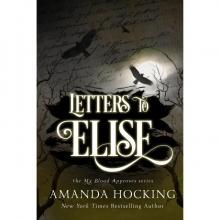 Letters to Elise: A Peter Townsend Novella
Letters to Elise: A Peter Townsend Novella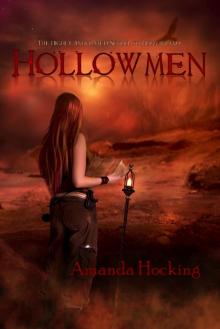 Hollowmen
Hollowmen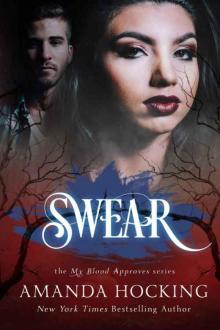 Swear
Swear Switched
Switched My Blood Approves
My Blood Approves Forgotten Lyrics
Forgotten Lyrics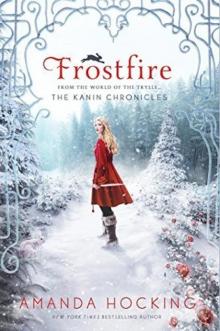 Frostfire
Frostfire Between the Blade and the Heart
Between the Blade and the Heart Wake
Wake Torn
Torn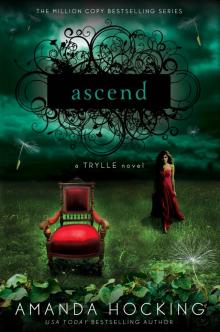 Ascend
Ascend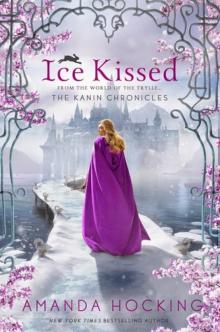 Ice Kissed
Ice Kissed Hollowland
Hollowland Fate
Fate Elegy
Elegy Lullaby
Lullaby Wisdom
Wisdom Tidal
Tidal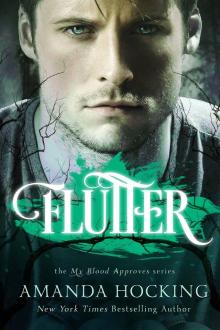 Flutter
Flutter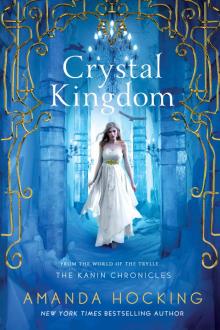 Crystal Kingdom
Crystal Kingdom From the Earth to the Shadows
From the Earth to the Shadows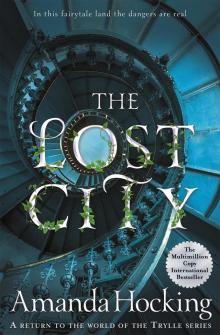 The Lost City
The Lost City The Morning Flower
The Morning Flower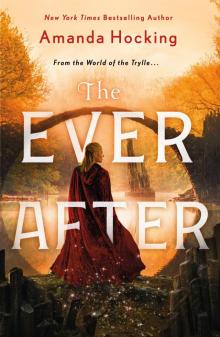 The Ever After
The Ever After Trylle
Trylle Watersong03 - Tidal
Watersong03 - Tidal Wisdom (My Blood Approves series)
Wisdom (My Blood Approves series) Virtue - a Fairy Tale
Virtue - a Fairy Tale Elegy (Watersong #4)
Elegy (Watersong #4)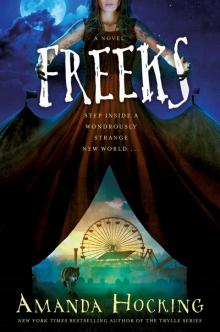 Freeks
Freeks Forgotten Lyrics: A Watersong Story (A Watersong Novel)
Forgotten Lyrics: A Watersong Story (A Watersong Novel)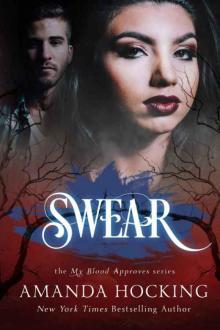 Swear (My Blood Approves #5)
Swear (My Blood Approves #5)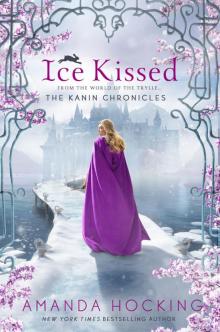 Ice Kissed (The Kanin Chronicles)
Ice Kissed (The Kanin Chronicles)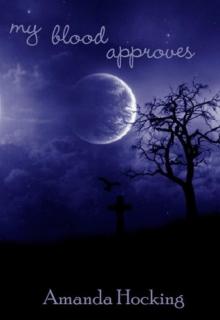 My Blood Approves mba-1
My Blood Approves mba-1 Forgotten Lyrics: A Watersong Story
Forgotten Lyrics: A Watersong Story Lullaby (A Watersong Novel)
Lullaby (A Watersong Novel) Wake (Watersong Novels)
Wake (Watersong Novels) Elegy w-4
Elegy w-4